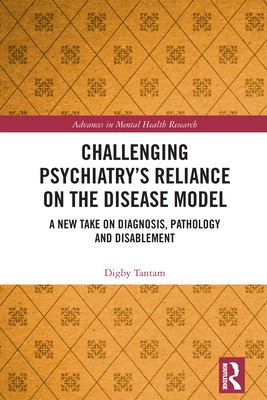
- We will send in 10–14 business days.
- Author: Digby Tantam
- Publisher: Routledge
- ISBN-10: 103270425X
- ISBN-13: 9781032704258
- Format: 15.6 x 23.4 x 1.6 cm, hardcover
- Language: English
- SAVE -10% with code: EXTRA
Challenging Psychiatry's Reliance on the Disease Model (e-book) (used book) | bookbook.eu
Reviews
Description
This volume critiques and challenges the use and promotion of the disease model in psychiatry, arguing that its misconceived approach prevents the preferred disablement model from becoming the default method to understand mental health conditions, including schizophrenia.
Featuring first-hand experiences as well as qualitative and quantitative findings, the book posits that mental illnesses are an expression of disablement, not disease, and that the alternative disablement approach (already being applied in the psychiatry of neurodevelopmental disorders but applicable to mental illness, too), allows for greater dignity and autonomy for the patient, collaboration between medical professionals, a replacement of categorical approaches with more appropriate dimensional ones, and a liberation from the restrictive idea of a 'cure'. Initial chapters of the book summarize the now overwhelming evidence that disease model is flawed, as is the simplistic materialism that psychiatry has built around the concept of the brain as kind of standalone biological computer. Later chapters consider the currently existent alternatives to the disease model, and puts forward the evidence for a psychiatry based on the person, as described by the philosopher Heidegger amongst others.
This volume will appeal to researchers, scholars, postgraduate students in clinical psychiatry, mental health research, and psychotherapy. Psychologists and clinicians active in research or teaching in mental health will also benefit from this volume.
EXTRA 10 % discount with code: EXTRA
The promotion ends in 4d.20:37:15
The discount code is valid when purchasing from 10 €. Discounts do not stack.
- Author: Digby Tantam
- Publisher: Routledge
- ISBN-10: 103270425X
- ISBN-13: 9781032704258
- Format: 15.6 x 23.4 x 1.6 cm, hardcover
- Language: English English
This volume critiques and challenges the use and promotion of the disease model in psychiatry, arguing that its misconceived approach prevents the preferred disablement model from becoming the default method to understand mental health conditions, including schizophrenia.
Featuring first-hand experiences as well as qualitative and quantitative findings, the book posits that mental illnesses are an expression of disablement, not disease, and that the alternative disablement approach (already being applied in the psychiatry of neurodevelopmental disorders but applicable to mental illness, too), allows for greater dignity and autonomy for the patient, collaboration between medical professionals, a replacement of categorical approaches with more appropriate dimensional ones, and a liberation from the restrictive idea of a 'cure'. Initial chapters of the book summarize the now overwhelming evidence that disease model is flawed, as is the simplistic materialism that psychiatry has built around the concept of the brain as kind of standalone biological computer. Later chapters consider the currently existent alternatives to the disease model, and puts forward the evidence for a psychiatry based on the person, as described by the philosopher Heidegger amongst others.
This volume will appeal to researchers, scholars, postgraduate students in clinical psychiatry, mental health research, and psychotherapy. Psychologists and clinicians active in research or teaching in mental health will also benefit from this volume.


Reviews